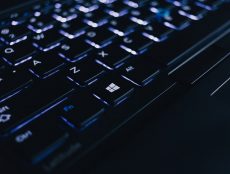
Articles
Why Cybersecurity and Privacy Are Important for All Students
By eLearning Inside
September 13, 2019
It wasn’t long ago that the only thing you needed to worry about as a student was getting good grades and having something to do over the weekend. Well, things have definitely changed today. Now you’ve got to worry about making sure nobody can keep tabs on what you do on the internet. Here’s exactly what kind of things are endangering your data, online freedom, cybersecurity and privacy as a student nowadays.
Learning Institutions Are Invading Students Cybersecurity and Privacy with Surveillance
It used to be you didn’t have to worry about the school principal or network admin seeing every word you type on the school computer, or what you search for online.
Not anymore.
Schools have now started using software that allows them to track everything students write on school computers.
“That’s not so bad,” you might think. “I can just use my laptop or mobile device to bypass that.”
That’s true, but that’s just the tip of this surveillance iceberg.
Some schools have even gone as far as hiring companies to monitor what people (students, kids, adults) say on social media, tag specific posts according to vague keywords, and alert the district’s superintendent, the chief of police, and the director of student services.
Yikes – that’s just a few steps away from Big Brother telling you what you can and can’t say.
Schools/Colleges/Universities Are Restricting Students’ Access to the Web
It’s pretty funny when you think of it. You’re going to school to learn, yet they’ve got no problem restricting access to certain information.
How do they do that? By using firewalls to block all sorts of websites. YouTube, Facebook, Twitter, Wikipedia – you can lose access to almost any website depending on the campus policy. If the rules say the network admin needs to block a platform for cybersecurity and privacy reasons, they’ll do it, no questions asked.
What’s more, firewalls will also keep you from downloading torrents.
Sure, it’s understandable why some campuses do that, but let’s be honest – students don’t exactly have tons of disposable income to spend on online entertainment. Not to mention that – depending on your situation – you can only get access to some school materials and software with torrents.
Data Breaches and Leaks Are Endangering Student Privacy
Just because you use a secured website doesn’t mean your data is never at risk. If the platform ever suffers a data leak or breach, all your personal info will be up for grabs, potentially ending up in the hands of a cybercriminal who’ll use it for scams, phishing attacks, or just sell it on the deep web for a profit.
Think that’s just a hypothetical scenario?
Well, for 50,000 Australian students, it wasn’t. They used a popular payment app for university societies and clubs, which eventually suffered a data breach that leaked user information, such as students’:
- Date of birth
- Phone numbers
- Facebook ID
- Full name
Another data leak resulted in up to 19,000 student records being exposed from the K12.com website. Data like full names, age, gender, and the students’ respective schools became public info overnight.
Hackers Now Target Learning Institutions More Than Ever
You wouldn’t think cybercriminals would bother with schools, colleges, and universities, but here we are.
Just two months ago, hackers successfully targeted 62 universities, stole student data, and used it to create thousands of fake accounts.
Something similar happened to hundreds of thousands of students across the US. The Pearson data breach resulted in cybercriminals getting their hands on sensitive info like email addresses, birth dates, and students’ full names.
And some more “sophisticated” hackers managed to steal telephone numbers, physical addresses, names, and email addresses from students at Lancaster University. They even managed to scam some students with fake invoices.
How You Can Protect Your Privacy and Data as a Student
If you’re a student, things aren’t looking too good for you cybersecurity and privacy-wise.
Luckily, there are some things you can do:
-
Use Security Software on All Devices
Hackers and surveillance companies often take advantage of your device’s lack of security. They expose you to malware that steals your sensitive data or keeps activity logs.
That’s why you should use antivirus and antimalware programs (like Malwarebytes) to keep any malicious files at bay.
Just make sure you always keep it up-to-date and schedule regular scans.
-
Use a VPN Service
VPNs are online services that can help you hide your IP address and encrypt your internet traffic.
Here’s why you should use a VPN as a student:
- Since it encrypts your traffic, that means nobody can monitor it. If they try, they’ll just see gibberish. So, you can torrent in peace without worrying about someone kicking you off the network.
- By hiding your IP address, VPNs help you mask your digital footprints, and make it harder for people to track you.
- VPNs make it easy to bypass firewalls, so you can access any websites you want on campus.
And you wouldn’t be the only one your age to use a VPN. More and more high school and college-aged internet users have started relying on this type of service, accounting for around 35% of VPN users.
In fact, VPNs such as TunnelBear have risen in popularity with students recently – likely due to the very low pricing, huge number of servers (1,000+), P2P support, and the service’s ability to obfuscate VPN traffic.
-
Make All Your Social Media Accounts Private
Social media surveillance is no joke, and your principal, guidance director, or teacher don’t need to know where you partied last Saturday, or when you’re going out for groceries.
So, you should make sure all your social media profiles are set to private. That way, you make sure only people you know and trust see your posts.
Here are some useful links to help you tweak you privacy settings:
Featured Image: Wes Hicks, Unsplash.









No Comments